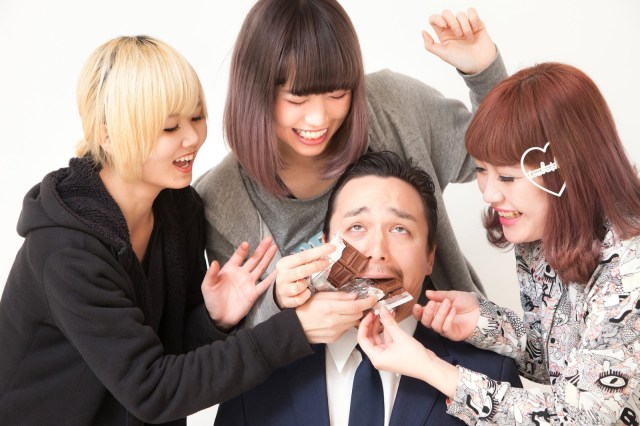
Survey results indicate that Japan’s Valentine’s Day custom of giri choco may soon become a thing of the past.
While Valentine’s Day in many countries might spark images of red roses, romantic dinners, and lovers generally spoiling each other, here in Japan it’s a day when women give chocolate to all the men in their lives.
Boyfriends and husbands receive “honmei choco” (“true feelings choco”), while all other men receive “giri choco” (“obligation chocolate”). These days, women give out “tomo choco” (“friend chocolate”) to female friends as well.
Men who receive gifts from women on Valentine’s Day are supposed to return the favour with a small gift on White Day a month later, on 14 March. However, given that women have to lead the way on 14 February, there’s an underlying pressure to ensure that chocolates are given to all the right male colleagues and friends in their circle to save themselves from committing a faux pas and causing offence.
Needless to say, Valentine’s Day can be a stressful and expensive experience for women, making the custom of giri choco a controversial one. In recent years, famous chocolate brands have weighed in on the debate, questioning its relevance in today’s modern world, and now more and more Japanese companies are stepping in to ban the practice from offices.
This increase in companywide bans on giri choco made headlines today, following a survey which revealed that almost 40 percent of male and female office workers see the practice of giri choco as a form of power harassment.
News site ANN reported the findings today, questioning people on the streets to gauge their opinion on the matter, and visiting a workplace where giri choco has been banned for the past six years. Everyone they interviewed all showed overwhelming support for companywide bans on giri choco, saying it helps to ease unnecessary pressure on women and have a positive effect on workplace relations.
As one of the female office workers in the video mentioned, “Before the office ban, we had to worry about things like how much is appropriate to spend on each chocolate and where we draw the line in who we give the chocolates to, so it’s good that we no longer have this culture of forced giving.”
As this notion of “forced giving” or “obligation” becomes increasingly tied to feelings of power harassment, which companies are taking very seriously, it appears that more and more offices might do away with the tradition of ghiri choco in the future. Which, if this Godiva statement is anything to go by, will be something that even luxury chocolate brands can agree with.
Source: ANN via Livedoor News, Hachima Kikou
Top image: Pakutaso
Insert image: Pakutaso


 Only one demographic in survey is happy about Japan’s workplace obligation Valentine’s chocolate
Only one demographic in survey is happy about Japan’s workplace obligation Valentine’s chocolate Godiva runs full-page ad asking Japanese women to stop buying so much Valentine’s chocolate
Godiva runs full-page ad asking Japanese women to stop buying so much Valentine’s chocolate Japanese women explain why they give “obligation chocolate” to male coworkers on Valentine’s Day
Japanese women explain why they give “obligation chocolate” to male coworkers on Valentine’s Day In Japan, women give “obligation chocolate” on Valentine’s Day, but do guys even want it?
In Japan, women give “obligation chocolate” on Valentine’s Day, but do guys even want it? Tokyo opens entire store dedicated to helping women buy obligation chocolate for Valentine’s
Tokyo opens entire store dedicated to helping women buy obligation chocolate for Valentine’s Japan’s new difficult-to-drink-from beer glass protects your liver, but it’s a brutal experience
Japan’s new difficult-to-drink-from beer glass protects your liver, but it’s a brutal experience How to order snacks on a Shinkansen bullet train in Japan
How to order snacks on a Shinkansen bullet train in Japan Demon Slayer: Kimetsu no Yaiba gets new roller coaster attractions and food at Universal Studios Japan
Demon Slayer: Kimetsu no Yaiba gets new roller coaster attractions and food at Universal Studios Japan New Pokémon ice cream, dessert drinks, and cool merch coming to Baskin-Robbins Japan【Pics】
New Pokémon ice cream, dessert drinks, and cool merch coming to Baskin-Robbins Japan【Pics】 Burger King Japan suddenly adds Dr. Pepper and Dr. Pepper floats to its menu nationwide
Burger King Japan suddenly adds Dr. Pepper and Dr. Pepper floats to its menu nationwide Hello, cosmetics! Clinique teams up with Hello Kitty this summer for first-time collaboration
Hello, cosmetics! Clinique teams up with Hello Kitty this summer for first-time collaboration “The most Delicious Cup Noodle in history” – Japan’s French Cup Noodle wins our heart【Taste test】
“The most Delicious Cup Noodle in history” – Japan’s French Cup Noodle wins our heart【Taste test】 To combat declining birth rate, Japan to begin offering “Breeding Visas” to foreigners
To combat declining birth rate, Japan to begin offering “Breeding Visas” to foreigners Starbucks teams up with Japanese shochu brewery for a whole new coffee experience
Starbucks teams up with Japanese shochu brewery for a whole new coffee experience Studio Ghibli releases giant Totoro plushies in Japan
Studio Ghibli releases giant Totoro plushies in Japan Nintendo history you can feel – Super NES, N64, and GameCube controllers become capsule toys
Nintendo history you can feel – Super NES, N64, and GameCube controllers become capsule toys Starbucks releases a cute Frappuccino and Unicorn Cake…but not in Japan
Starbucks releases a cute Frappuccino and Unicorn Cake…but not in Japan Kyoto Tower mascot termination reveals dark side behind cute Japanese characters
Kyoto Tower mascot termination reveals dark side behind cute Japanese characters McDonald’s Japan’s Soft Twist Tower: A phantom ice cream only sold at select branches
McDonald’s Japan’s Soft Twist Tower: A phantom ice cream only sold at select branches Yabai Ramen: What makes this Japanese ramen so dangerous?
Yabai Ramen: What makes this Japanese ramen so dangerous? Finally! Nintendo Japan expands Switch 8-bit controller sales to everybody, Online member or not
Finally! Nintendo Japan expands Switch 8-bit controller sales to everybody, Online member or not Japanese government wants to build luxury resorts in all national parks for foreign tourists
Japanese government wants to build luxury resorts in all national parks for foreign tourists 10 things you should buy at 7-Eleven in Japan
10 things you should buy at 7-Eleven in Japan Studio Ghibli releases anime heroine cosplay dresses that are super comfy to wear
Studio Ghibli releases anime heroine cosplay dresses that are super comfy to wear Woman charged for driving suitcase without a license in Osaka
Woman charged for driving suitcase without a license in Osaka Studio Ghibli unveils My Neighbour Totoro miniature house model
Studio Ghibli unveils My Neighbour Totoro miniature house model Kyoto experiencing problems with foreign tourists not paying for bus fares, but not on purpose
Kyoto experiencing problems with foreign tourists not paying for bus fares, but not on purpose Fighting mild hunger with a Japanese soda that turns into jelly in the stomach【Taste test】
Fighting mild hunger with a Japanese soda that turns into jelly in the stomach【Taste test】 Studio Ghibli’s Howl’s Moving Castle tapestry unveiled in Japan for first time
Studio Ghibli’s Howl’s Moving Castle tapestry unveiled in Japan for first time McDonald’s new Happy Meals offer up cute and practical Sanrio lifestyle goods
McDonald’s new Happy Meals offer up cute and practical Sanrio lifestyle goods Sales of Japan’s most convenient train ticket/shopping payment cards suspended indefinitely
Sales of Japan’s most convenient train ticket/shopping payment cards suspended indefinitely Sold-out Studio Ghibli desktop humidifiers are back so Totoro can help you through the dry season
Sold-out Studio Ghibli desktop humidifiers are back so Totoro can help you through the dry season Japanese government to make first change to romanization spelling rules since the 1950s
Japanese government to make first change to romanization spelling rules since the 1950s Foreigner’s request for help in Tokyo makes us sad for the state of society
Foreigner’s request for help in Tokyo makes us sad for the state of society Ghibli founders Toshio Suzuki and Hayao Miyazaki contribute to Japanese whisky Totoro label design
Ghibli founders Toshio Suzuki and Hayao Miyazaki contribute to Japanese whisky Totoro label design Doraemon found buried at sea as scene from 1993 anime becomes real life【Photos】
Doraemon found buried at sea as scene from 1993 anime becomes real life【Photos】 Tokyo’s most famous Starbucks is closed
Tokyo’s most famous Starbucks is closed Princesses, fruits, and blacksmiths: Study reveals the 30 most unusual family names in Japan
Princesses, fruits, and blacksmiths: Study reveals the 30 most unusual family names in Japan Survey shows Japanese women would love to be getting some chocolate on Valentine’s Day too
Survey shows Japanese women would love to be getting some chocolate on Valentine’s Day too Survey reveals Japanese men really want home-made chocolate, but are women willing to make it?
Survey reveals Japanese men really want home-made chocolate, but are women willing to make it? This Valentine’s Day, tell him you don’t love him with Japanese women’s “chocolate maggot” recipe
This Valentine’s Day, tell him you don’t love him with Japanese women’s “chocolate maggot” recipe Shabani the gorilla is so handsome he’ll be appearing on sweets in Japan this Valentine’s Day
Shabani the gorilla is so handsome he’ll be appearing on sweets in Japan this Valentine’s Day Is the coronavirus going to kill Japan’s obligation chocolate Valentine’s Day custom?
Is the coronavirus going to kill Japan’s obligation chocolate Valentine’s Day custom? Japanese girls reveal who they really give most Valentine’s chocolates to, and it’s not boys
Japanese girls reveal who they really give most Valentine’s chocolates to, and it’s not boys Japanese chocolates come to life as ikemen “hot guy” anime characters
Japanese chocolates come to life as ikemen “hot guy” anime characters Krispy Kreme takes aim at Mister Donut with new doughnuts for Valentine’s Day
Krispy Kreme takes aim at Mister Donut with new doughnuts for Valentine’s Day Happy Virus-times! How has the pandemic affected Japan’s chocolate budget for Valentine’s Day?
Happy Virus-times! How has the pandemic affected Japan’s chocolate budget for Valentine’s Day? Chocolate-fed sushi fish set to become a Valentine’s Day treat in Japan
Chocolate-fed sushi fish set to become a Valentine’s Day treat in Japan Han Solo and other Valentine’s Day chocolates we weren’t lucky enough to get
Han Solo and other Valentine’s Day chocolates we weren’t lucky enough to get Don’t bother, ladies: Survey reveals most Japanese guys don’t want your Valentine’s chocolate
Don’t bother, ladies: Survey reveals most Japanese guys don’t want your Valentine’s chocolate Survey by Japanese ministry reveals high rates of “maternity harassment” in workplace
Survey by Japanese ministry reveals high rates of “maternity harassment” in workplace Japan’s chocolate eggs with Pokémon figures are a compelling argument to eat multiple desserts
Japan’s chocolate eggs with Pokémon figures are a compelling argument to eat multiple desserts Barely half of Japanese men in survey will give thank-you gift to women for Valentine’s chocolate
Barely half of Japanese men in survey will give thank-you gift to women for Valentine’s chocolate Starbucks Japan’s new Frappuccino is like…the U.S. in a cup
Starbucks Japan’s new Frappuccino is like…the U.S. in a cup
Leave a Reply